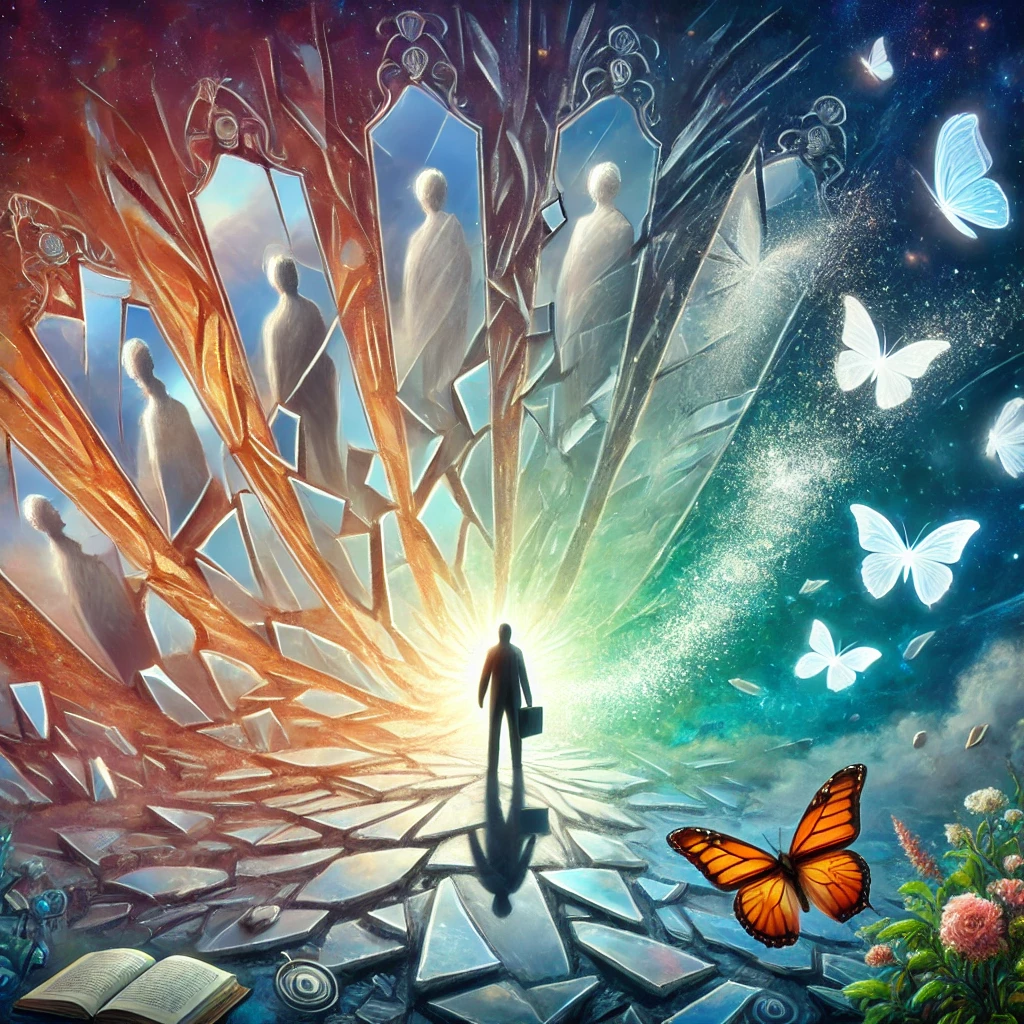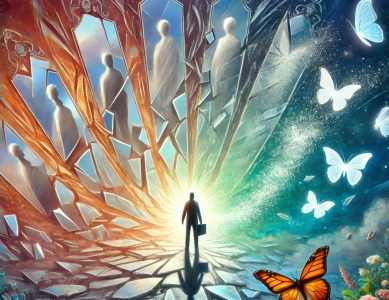Understanding the Layers of the Self
There’s comfort in the familiar—a sense of security in knowing who we are, or at least who we think we are, in the vastness of this universe. But sometimes, I wonder if we truly allow ourselves the space, especially professionally, to explore the complexity that speaks to the core of who we are as humans.
Take our generation and the ones before us, so devoted to a narrow definition of career, investing decades of energy into climbing the career ladder and rolling with the punches, only to one day be told, “Thank you; we no longer require your services.” That day eventually comes for most of us, whether through retirement, a merger or acquisition, or adopting new technologies that render specific roles obsolete.
Or simply because someone is better connected than you, or because your company has little tolerance for what you really think about the two-million-dollar strategy they paid consultants for—the same consultants you had to hand-hold because they knew nothing about your business—only to be shelved and never be put into action. Or perhaps it’s because you were too outspoken about the decision to fire two hundred people in your UK operations without warning because profit margins were scraping bottom—choosing layoffs over finding ways to grow the business instead. Do you think this example is too extreme? No, it’s not; companies often respond with layoffs instead of first considering how to generate more revenue for a struggling business. And it’s not viewed as a last-resort strategy, which it ought to be.
Eventually, you get a watch and a farewell party, or HR or security escorts you to the elevator, which feels more like a good riddance than a thank you. You never know what that final exit will look like.
The individuals you developed and nurtured—the ones whose interests you put before yours—sure, they’ll stay in touch for a while, maybe throughout the next couple of years or maybe three, because they genuinely cared for you, but eventually, everyone moves on with their lives, and you’ll no longer hear from them.
In the past, perhaps we felt the need and pressure to streamline ourselves into something more digestible for the world to understand—something our parents could proudly share when running into Abu Hassan from the old neighborhood after ten years, whose kids are now senior executives at Chevron. “My elder son Adam is now working for a multinational. Yes, he’s the Head of Projects there. They love him.” And then they’ll add that you married a doctor, never mind that your marriage might be miserable because you hardly see each other due to your demanding schedules, and your go-to style of communication is an argument, usually about who’ll help the kids with their homework.
This push toward simplicity, especially in our professional lives, can feel like a reduction of our identity—an oversimplification that strips away the richness of our multifaceted natures.

Erik Erikson, a critical theorist in identity development, describes identity as a fluid and evolving process shaped by the roles and experiences we encounter throughout life. He argued that this constant evolution is natural and necessary for growth, but it can be deeply challenging for those who’ve built their sense of self around a single, fixed professional role.
Even if you’re a CEO, if the company isn’t yours, you’re still ultimately an employee, subject to the same uncertainties and the whims of politically astute individuals who feel entitled to what they haven’t earned and what you’ve slogged your entire life for. This model of staying in one lane while offering stability often leads to a narrow sense of self, where professional roles become the primary lens through which we define our worth.
You’re surviving on four hours of sleep a night, hopping from one plane to another, where day and night blur into each other. You wake up disoriented in hotel rooms, unsure which time zone you’re in. Meticulous organization is the only thing holding your schedule together. Then your moron boss—a self-proclaimed disrupter who loves throwing chaos into the mix—drops a last-minute bombshell the day before a critical presentation. He knew about it a month in advance, but now it’s suddenly your problem to solve.
You’re running on fumes, pushing through, convincing yourself it’s just part of the job. But deep down, you know this is not normal, and this level of self-sacrifice isn’t sustainable, nor is it healthy for a clear mind.
There is a good kind of selfishness: the kind where you put the oxygen mask on yourself first so you can truly benefit everyone else around you.
The Burden of the Old Identity: When Company Culture Becomes Self-Definition
Alignment with company culture is crucial for both individual success and organizational harmony. Culture sets the tone for everything—from team relationship dynamics to attitudes, values, and behaviors, written or unwritten, spoken or unspoken. It enables teams to work cohesively toward shared goals and helps create a unified brand identity that customers and clients can trust.
When employees align with the culture—and if that culture is positive—it enhances productivity, reduces friction, and ensures everyone moves in the same direction. This alignment creates shortcuts in understanding and communication. Organizational awareness, the ability to navigate and understand the informal and formal power dynamics within a company, is a critical skill that goes hand-in-hand with this alignment.
But when you think about it, there’s a significant investment from both sides. On the company’s side, there’s endless training, policies, processes, messaging, management trainee programs, functions and seminars, e-learning platforms, marketing, and employer branding—all designed to create an almost cookie-cutter representative who embodies the company’s values and image. The company invests heavily in molding you into someone who fits their brand as closely as possible, so much so that you become the hand of the company that reaches out into the world, shaking hands with customers and external stakeholders. You become an extension, a personification of the brand in the outside world, seamlessly blending your identity with the organization’s.
On your side, you invest just as much in fitting in—learning to wear the right clothes, drive the right cars, speak the lingo, and figure out which jokes to laugh at. Like the time you laughed along and winked when your CEO made an inappropriate comment about Judy—your close colleague whom you’ve always deeply respected— how what she was wearing accentuated certain parts of her anatomy. Inside, it made you cringe with self-loathing and question what kind of person you’ve become. It left you feeling complicit and disloyal, both of which you viewed with equal revulsion.
You learned to play golf even though you hate it and think it’s a colossal waste of time and money, discuss expensive wines despite your aversion to alcohol, and developed that refined sense of attunement to unspoken cues. You’ve trained yourself to notice subtle shifts in tone, body language, seating arrangements, and even the meaning of the placement of office furniture. This constant vigilance is necessary to thrive in a competitive workplace, where understanding the hidden rules and power structures is often more important than skills, accomplishments, and formal qualifications.
In a positive culture, being part of something greater than yourself has its own high. You feel a genuine sense of belonging, camaraderie, and trust within the team. The experience of supporting each other, learning from each other, and working together to accomplish stretching goals can be immensely rewarding. When you leave at the end of the day, there’s a sense of satisfaction knowing you did a good day’s work, and your conscience is content with the output. You are eager to start your day every morning, excited to see your colleagues and enthusiastic about your new projects.
For those entering the workforce straight out of university or in the early years of their careers, joining the right organization can be particularly formative. It can mold you into a true professional, teach you how to approach problems from multiple dimensions, set and achieve goals, and express yourself with the right level of assertiveness, cultural awareness, and polish in a manner that fosters trust and respect within a team. You learn what to focus your attention on, how the organization perceives value, and why. It builds confidence through a sense of achievement and provides channels for feedback on how you can constantly improve. And if you’re really fortunate, you’ll get to learn from some of the best people in the industry. A positive culture can nurture and develop skills that you’ll continue to monetize for the rest of your life. These early experiences lay a strong foundation for navigating the complexities of the professional world, influencing not just your work habits but also your approach to every business encounter.

When Your Professional Persona Becomes Your Whole Identity
Whether you’re part of a positive or negative culture, the question remains: after 10, 15, or even 25 years, where does that leave you? It’s like being part of a duo for most of your life—you can no longer distinguish where one of you begins, and the other ends because you’ve internalized a way of being that revolves around this partnership. You’ve subsisted entirely within the frame of that duo, which isn’t as dependent on you as you are on it. The process of aligning yourself so closely with the company blurs the line between your professional persona and your identity. You start to wonder where you exist outside the small universe of the organization.
The concern isn’t just who you are within the company but who you become outside of it. When your identity is deeply tied to your role, stepping away can feel like entering a void—a wilderness where the familiar markers of who you are no longer exist. This psychological wilderness can leave you feeling lost and unsure of how to define yourself without the framework the company provided. Sartre’s notion of existential freedom becomes relevant here: once stripped of the corporate identity, you are faced with the freedom—and burden—of defining yourself anew, which can be both liberating and terrifying. As Sartre famously said, “Man is condemned to be free because once thrown into the world, he is responsible for everything he does. It is up to you to give life meaning.” The challenge, then, is not just in gaining this freedom but in learning how to navigate it.
Erich Fromm explores this challenge of self-redefinition in his work Escape from Freedom. Fromm argues that individuals often fear the responsibility of true freedom because it requires them to define their own values and sense of purpose without relying on external structures. As he eloquently states, “The main task in life is to give birth to oneself, to become what one potentially is. The most important product of his effort is his own personality.” (Man for Himself)
Adopting a company identity to the point where it defines your entire being isn’t just about fitting into a corporate culture—it’s about surrendering the freedom to explore who you are beyond those boundaries. The result is a narrowed sense of self, where you no longer show up as a fully realized person but as an extension of the brand you represent. Psychologically, this can lead to a crisis of identity when the corporate structure is removed, leaving you with the task of rediscovering who you truly are—beyond the labels, the roles, and the image you’ve intentionally molded through years of highly immersive conditioning.
For those transitioning out of the military, this challenge is tough. In the armed forces, hierarchy is built into every interaction, with clear expectations for how individuals relate to each other within a defined chain of command. Civilian life, small businesses, and modern workplaces often collapse these hierarchies and remove the layers of formal distance and structured interaction protocols. The absence of these invisible boundaries can make finding one’s footing in new social and professional contexts very difficult. This disorientation is more pronounced for those who entered the military immediately after school and have known no other way of engaging with the world since.
Learning from Generation Z: A Broader Scope of Being
While this struggle is real for many, we can learn valuable lessons from the approach Generation Z takes toward work in the modern world. Unlike many of us from earlier generations, who often tied our self-worth to specific careers, status, and career progression, Gen Z views work as multifaceted and just one aspect of life, not its defining feature. They value personal freedom and seek ways to produce value that align with their interests while maintaining a balance that gives life broader meaning. They have cultivated a more holistic perspective—one that sees work as essential, but not the core of their identity.

The impact of COVID-19 has accelerated this shift in perspective, drastically altering how people view work. The pandemic forced a reevaluation of priorities for many people across the world, leading them to explore new ways of making a living through the gig economy, freelancing, and e-commerce platforms like Etsy and Shopify. These digital avenues have democratized opportunities, allowing individuals to build businesses or side hustles that align more closely with their lifestyles and value hierarchy.
Social media platforms like YouTube, Instagram, TikTok and Patreon have also played a significant role, enabling people to share their skills, hobbies, and knowledge with a global audience, they have turned knowledge into currency. Content creation has become a viable career path, allowing individuals to express themselves while generating income. This landscape encourages more flexible identities that extend beyond the concept of a single profession or corporate role.
This morning, I was introduced to a logistician with eight years of supply chain management experience who is also a certified yoga instructor. Her ability to blend two seemingly unrelated pursuits allows her to engage with a diverse range of people and cultivate a richer inner world. She doesn’t just identify as a professional within one industry; instead, she integrates different aspects of herself, embodying the flexibility and multidimensionality that Gen Z values. The way she entered our office and introduced herself—so self-assured, warm, and upbeat, with such animated facial expressions—made it clear there was no first-day anxiety. She engaged with us effortlessly, asked questions about what Akbar and I do, and her eyes didn’t glaze over, even when he didn’t give her the short, non-technical version. As soon as she walked out the door, we both looked at each other and said, “Yep, she’s different—she’ll do well.”
For many in Gen Z, professional nomadism—moving between different roles, industries, careers or countries—is preferred. This adaptability gives them a wider perspective, allowing them to absorb a broader world and resist the traps of a singular, go-for-broke commitment to a rigid self-image. Their ability to regularly reinvent themselves without fear of losing status is refreshing and gives us something to ponder: perhaps they’ve got it right. This mindset can be liberating for those moving out of long-term roles and grappling with existential questions like, “Where did the years go?”
Final Words
But peeling off the old layers isn’t just about discarding the past but making room for the new—growth, fresh experiences, and a renewed sense of purpose. It can feel like shedding a layer that’s been a part of you for so long—like letting go of a protective shield that may leave you feeling raw and vulnerable at first. It’s even more complicated when it coincides with thoughts about aging and wondering what more pleasant surprises could possibly be in store for you.
Maybe it’s because I’ll be turning 51 in a few months—I’m not sure, as these feelings are quite alien to me. But I’ve felt a lot like that over the past three months. There’s this nagging reminder that I haven’t reached where I once hoped to be or accomplished what I initially set out to achieve. The past four years have been entirely unplanned—like being hit over the head by a cricket ball out of nowhere courtesy of the pandemic – well, more or less, but that’s a story for another day. It’s as if I had set my GPS to Switzerland but ended up on Mars. But I suspect that one day, I’ll realize I may have been wandering around with the wrong weighing scales and navigational coordinates all along.
Undoubtedly, I’ve learned so much during the past few years that I wouldn’t even know where to begin trying to quantify the value. The skills I’ve developed have added significant depth to the quality of my life and work experience, making it far more interesting and, most of the time, a lot of fun. Even the failures and the hard times, have contributed to this growth in ways I couldn’t have anticipated.
So, let go of rigid expectations about who you need to be. Embrace change as a natural part of life, and give yourself permission to redefine what success and fulfillment look like for you because in the end, you’ll discover that realizing that the value you contribute isn’t tied to the company brand, its resources at your disposal, or the letters beneath your name on a business card, will change your life. It’s about standing on your own two legs once again with the Almighty’s grace, and trust me on this: then when you say “I am,” it will come from a different place. The sooner you recognize that and accept it, the sooner you can start building again—perhaps not the same false idols, but something far better and much more meaningful.
Suggested Reading:
- “The CEO’s Guide to Retirement” by Marc A. Feigen and Ron Williams — I came across this article in HBR this morning 31st August, 2024, which offers insights into the challenges CEOs face after stepping down from their roles. One title in particular stood out: “Prepare to deal with yourself: Retirement can put even the most self-assured chief executives in the unfamiliar position of self-questioning and self-doubt”….And: “You need to know who you are when you’re done being CEO.”
- “The Second Mountain” by David Brooks, which I read four years ago and absolutely loved (too elaborate in some chapters). It explores how a life of service and deeper connections can offer fulfillment after a career focused on personal achievement.


